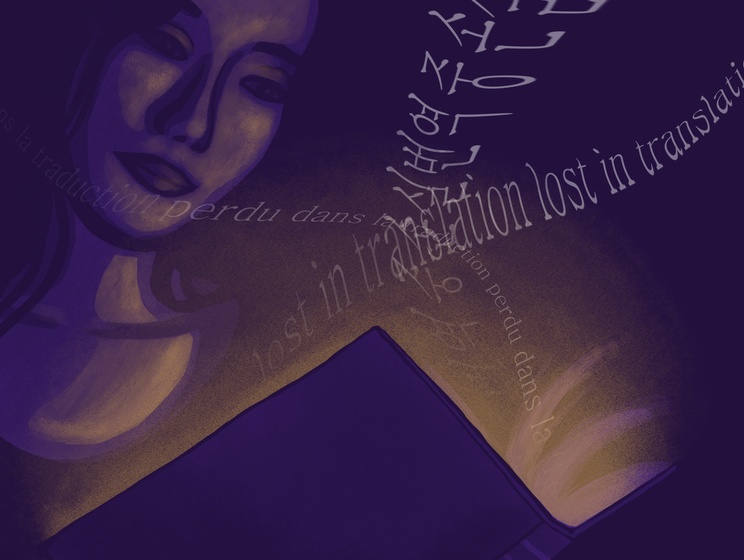{shortcode-4411e2b37f416882a574eeee747474681078ec63}
{shortcode-69a9ed06c887cb075e6988b5c6d61980cc21c96c}y name is Elane, and I like to cry when I read. The thing is, when I cry, I can usually pinpoint a reason for the tears, the sting in my nose, the stuffy feeling that takes root in my chest. In the film “Minari,” home is a grandmother’s tight pinch as much as it is a warm meal, Kathy and Tommy are in love and still unhappy in “Never Let Me Go,” and St. Exupery’s little prince never makes it home to his rose. And so when I cried while reading “Dictee” by Korean American writer Theresa Hak Kyung Cha, I found myself at a loss — for reason, for memory, for the tissue packs I always forget to buy in bulk.
At first glance, “Dictee” does not check the same boxes that many of my cry-reads do: It does not involve a pair of star-crossed lovers, hopeless fates sealed by an infinite time loop, or a narrator imbued with temporary, childlike wonder.
Instead, “Dictee” is as bald as it is literary: a collection of lyrical poems, fragmented narratives, letters to a mother from an unspeaking daughter. It is an autobiography about absence, about everything that gets lost in between languages and in between identities.
Writing interchangeably in English, Korean, and French, Cha explores what it means to be the native speaker of displacement, of forced assimilation, only to reimagine the immigrant narrative through a second language: her own voice.
Beyond the confines of language and geography, the body is established as both communicative and political: a site of interruption, whether at the sentence-level or in a warzone. Yet Cha persists in her own language, persists in untranslatability, persists in simply being. For a Korean American writer like myself, it is a solemn, personal, and deeply intimate revolution. It is so close to home that it feels like remembering.
I hesitate to call “Dictee” anything but an autobiography. It is nothing if not a lifetime condensed into pages, a reclamation of all that is lost in translation: wooden chopsticks clinking against metal forks, recipes with no measurements passed down through blurred Korean, a daughter failing to look up when called by a name that’s not in English.
My Korean name is 민채. Romanized: Minchae. If you call me by this name, I probably will not recognize it as one. 민채, according to my Appa, means people’s vegetable. There are many ways to interpret the characters, many options for translation: snowdrop or quiet grace, droplets of light or boughs of ripe jade. But of all the choices, Appa chose people’s vegetable.
Funnily enough, sometimes, the only person who calls me by my Korean name is myself. At home, during class sections, even when my grandparents’ voices echo from across an ocean, I am Elane.
Sometimes, I like to interpret my name as harvest or a full stomach or limbs heavy with bounty. I imagine an alternate timeline in which I am gleaming jade in a rising ocean or a snowdrop that only blooms once every century, fleeting and lonely. I imagine myself unhyphenated, my name calculus-smooth.
But I think twice about calling language broken. I think about what it means to be built from these unwanted fragments, about whether fracture can be inherited, a trait that dominates. I think about what it means to find myself in a language that is simultaneously alien and intimate. To lose myself, too.
My name holds many meanings like I hold many selves, each impossibly possible. In Korean, the word 성 means surname. Appa tells me one day that 성 also means castle. That 성 is gender and 성 is holy. It is a word with so many translations, so many simultaneous lives, that I find it hard to choose just one.
Romanized in English, it sounds like the word sung. And so in this language, I find that the names that follow me are castles of memory. I collect them like lost coins, loose teeth — things worth finding for the sake of joy, however small.
I am reminded of how we name cities after heavenly places, children after virtues, as if to predicate their sublimity. A few hours from my hometown rests Paradise, California: quiet light, fresh air, an indistinct conglomerate of green. It is lush and bright in my mind, and then it burns. This great weight of a name, and it still bursts into flames.
***
{shortcode-7b0d78f749b7c9782f39de42e5139c59e2b30f27}eading and re-reading Cha, I find myself thinking about language as something internal, like how cells hold instructions for their own death or how birds always know the way home. It is in the meals we prepare, the stories we tell, the names we carry: language as both refuge and battlefield, prayer and war.
At times like this, I think there is nothing wrong with being a vegetable, a tiny piece of a people’s republic. I collect steaming mugwort, sweet chard, the tender greens of chrysanthemum flowers. My mouth stumbles around bracken fiddleheads — toxic in the wild, bitter death sucked out only by a mother’s careful touch.
I think I gravitate towards Cha because her work is so difficult to condense into one interpretation. She embraces narrative difficulty and leans into that which cannot be pinned down, that which cannot be defined.
Cha’s narrator goes unnamed, the sole citizen of an unspeakable country. Yet still her voice echoes: she tells herself that “if she were able to write she could continue to live.”
I think I understand what she means. I think that when I cry, I am learning to be untranslatable. To be a mouthful of bitterness and enough warmth to tide the night. To be a language of stars, destined to wobble and precess, to shed light off in great skins.
민채, meaning harvest, meaning bounty, meaning fullness still. 민채, meaning here.
— Magazine writer Elane M. Kim can be reached at elane.kim@thecrimson.com.


